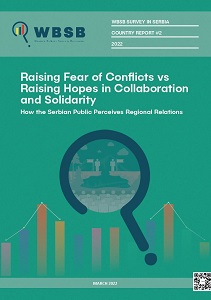Raising Fear of Conflicts vs Raising Hopes in Collaboration and Solidarity
Raising Fear of Conflicts vs Raising Hopes in Collaboration and Solidarity
Author(s): Luka Šterić, Maja Bjeloš
Subject(s): Politics / Political Sciences, Politics, International relations/trade, Geopolitics, Peace and Conflict Studies
Published by: BCBP Beogradski centar za bezbednosnu politiku
Keywords: peace and conflict; Serbia; regional relations; international relations; solidarity; Western Balkans
Summary/Abstract: In recent months, citizens in the Balkans have been talking intensely about whether there will be a new conflict in Bosnia and Herzegovina or between Serbs and Albanians in Kosovo. While democratisation and Euro-Atlantic integration were one of the main drivers of reducing tensions after the Yugoslav wars, the current context in the Western Balkans is characterised by democratic regression, and even the restoration of autocracy as ideologies of the 1990s resurface, accompanied by the negligence of the entire region on the part of the EU. The COVID-19 pandemic has only accelerated the overall trend of democratic erosion and exposed populist leaders willing to use every crisis to grab even more power and further undermine democratic norms and institutions, while exploiting long-standing ethnic divisions. In such an environment, there is little room for genuine cooperation among the Western Balkan countries. In recent years, Serbia has worked intensively to improve relations with global and regional powers, and to turn old enemies into new friends, such as the United States, Turkey or Hungary, while Serbia’s relations with most Western Balkan countries could be described as “one step forward, two steps back”. Much of the incentives for regional cooperation and the improvement of bilateral relations between the Western Balkans countries has been driven by the EU or its members states. However, as the entire region became increasingly isolated due to the disappearance of the EU accession prospect in the near future, some Western Balkan countries have decided to launch their own initiatives. To shed the light on the Serbian public views on regional dynamics, potential for conflicts in the region, but also regional cooperation and solidarity, the Belgrade Centre for Security Policy (BCSP) conducted a public opinion survey from mid to late September 2021, on a sample of 1,000 Serbian citizens. The results of the survey are presented in the following paragraphs.
Series: Beogradski Centar za Bezbednosnu Politiku - POLICY PAPERS
- Page Count: 20
- Publication Year: 2022
- Language: English
- Content File-PDF

